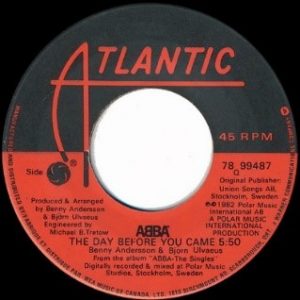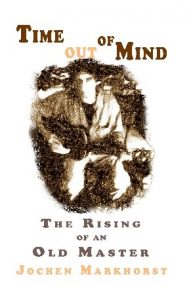This week saw the release of Jochen’s book on Time Out Of Mind; a song-by-song analysis of all the songs on this late masterpiece plus the outtakes “Red River Shore”, “Dreamin’ Of You” and “Marchin’ To The City”.
Plus, as a bonus, “Things Have Changed”, which for reasons not entirely clear is considered a TOOM song by Dylan and his publisher.
Available as paperback and e-book in German, English and Dutch on Amazon. The English version also available as a hardcover: www.amazon.com/dp/B0B47QDLPK
by Jochen Markhorst
I The Day Before You Came
 Rolling Stone dismissed them, or rather their album Arrival (1976, the album with “Dancing Queen” and “Money, Money, Money”) as “muzak mesmerizing in its modality”, their already “vapid lyrics” being reduced to “utter irrelevance”. More than 40 years later, Björn nods in recognition and grins: “I mean, they were harsh, those critics.” “Yeah,” Benny adds, “we had the wrong clothes and the wrong image overall – but I have to say: I didn’t care much. I don’t think anyone did.” (CBS Sunday Morning, October 2021).
Rolling Stone dismissed them, or rather their album Arrival (1976, the album with “Dancing Queen” and “Money, Money, Money”) as “muzak mesmerizing in its modality”, their already “vapid lyrics” being reduced to “utter irrelevance”. More than 40 years later, Björn nods in recognition and grins: “I mean, they were harsh, those critics.” “Yeah,” Benny adds, “we had the wrong clothes and the wrong image overall – but I have to say: I didn’t care much. I don’t think anyone did.” (CBS Sunday Morning, October 2021).
The opinion of a few conceited music journalists should indeed hardly matter when you have such a massive fan base and score such astronomical sales figures. And the opinion of the real connoisseurs and professionals, successful musicians, will probably weigh more heavily too. Led Zeppelin recorded their last studio album, In Through The Outdoor, at Abba’s Polar Studios, and in between Robert Plant painted Stockholm red together with Björn and Benny. Elvis Costello never disguises his admiration, borrows the triumphant grand piano lick of “Dancing Queen” for his biggest hit “Oliver’s Army”, bases the Bacharach collaboration “This House Is Empty Now” on a line from “Knowing Me, Knowing You” (on walking through this empty house, tears in my eyes), and goes on to reveal in his autobiography that they listen to Arrival on the tour bus and “our Abba cassettes, even early recordings in Swedish that I proudly purchased at the service stations and listened to faithfully.”
Even more unlikely but convincingly documented is the Abba love of Nirvana’s Kurt Cobain (he adored the Abba cover band Björn Again), and of the Sex Pistols. In his 1994 autobiography No Irish, No Blacks, No Dogs, Johnny Rotten admits that “Pretty Vacant” was based on “SOS”.
“Glen [first bass player Glen Matlock] was a closet Abba fan, and funny enough, so was Sid [Sid Vicious, Matlock’s successor]. We got rid of one Abba fan and got another one in its place. Once Sid ran up to the girls from Abba in the Stockholm airport to ask for their autograph. Sid was completely drunk and stuck his hand out. They screamed and ran away.”
Nevertheless, we have to agree, reluctantly, with one point being made by those sour critics: the “vapid lyrics” of “I Do, I Do, I Do, I Do, I Do”, “Mamma Mia”, “Fernando” and all the other million sellers do not have much depth or poetic brilliance. With one, extraordinary, brilliant exception: the poetic masterpiece “The Day Before You Came”.
It is, perhaps tellingly, the last song Abba wrote and recorded, and in more ways than one (lyrically, arrangement, the sparse melody line) is a break from the trend. It does seem to be a first step towards the next career of “the unmolested masterminds behind ABBA” (Costello) Benny and Björn, a step towards musicals. The lyrics tell, in stripped-down prose but still with fascinating, Dylanesque vagueness, how a banal, uneventful life of the female protagonist is definitively and irrevocably capsized by – presumably – a brief, sweeping love affair that is already over. I was all right ’til I fell in love with you;
Must have left my house at eight, because I always do My train, I'm certain, left the station just when it was due I must have read the morning paper going into town And having gotten through the editorial, no doubt I must have frowned I must have made my desk around a quarter after nine With letters to be read, and heaps of papers waiting to be signed I must have gone to lunch at half past twelve or so The usual place, the usual bunch And still on top of this I'm pretty sure it must have rained The day before you came
What Agnetha veils or at best insinuates in “The Day Before You Came” is expressed by Dylan’s “’Til I Fell In Love With You” in baroque multicolour. The dazed lady from Abba’s song acknowledges that until The Day she “had no sense of living without aim”, and “at the time I never even noticed I was blue”, thus merely insinuating that now her state is the dramatic opposite. Dylan’s narrator is not insinuating. On the contrary:
Well, my nerves are exploding and my body’s tense I feel like the whole world got me pinned up against the fence I’ve been hit too hard, I’ve seen too much Nothing can heal me now, but your touch I don’t know what I’m gonna do I was all right ’til I fell in love with you
… but the emotional state of the protagonist is, of course, exactly the same: total despair after a devastating love affair. Just as the structure chosen by both Dylan and Björn Ulvaeus is identical. In Abba, four interchangeable stanzas tell the same story four times; the mind-numbing monotony in which the protagonist floats through life, culminating in the recurring refrain line the day before you came. In Dylan’s song, five interchangeable stanzas describe the same story five times: the inner battlefield of the crushed protagonist, culminating in the recurring refrain line I was all right ’til I fell in love with you.
Stylistically, the lyrics (obviously) differ enormously. Ulvaeus’ lyrics have the couleur of a to-do list, deliberately of course, brilliantly blurred by that endless row of I must haves. Eloquent – again, deliberately – it is not. Dylan, on the other hand, is far from restrained. To describe the state of his protagonist, he plunders his inner jukebox, the books on his bedside table, his meandering, associative brain, Henry Rollins and the Bible. Naturalism versus expressionism, to put it a bit more academically.
This guy is one of the few sparked-up protagonists on Time Out Of Mind, one might be inclined to think after the explosive opening line. All the other men are burned-out, world-weary, sometimes even zombie-like creatures, but this man seems quite over-stimulated, tormented by smothering, suffocating oppression. The image, however, does not last; already in the third line, the line borrowed from Henry Rollins I’ve been hit too hard, I’ve seen too much, the numbness descends again – this sucker, too, is stricken and defeated.
It looks like a core line. The lines around it are filled with echoes from other songs, or so it seems. Dylan has sung “against the fence” a few times on stage with Van Morrison, in Van The Man’s beautiful “And It Stoned Me” (“We just stood there gettin’ wet / With our backs against the fence”), although the word combination is not too distinctive.
Nor is her “healing touch”. John Hiatt’s “Through Your Hands” has a similar image, and in recent years has been sung by Don Henley, by David Crosby, and by others – the song may have entered Dylan’s ears as well. The appeal for Dylan, however, will lie mainly in its evangelical connotation. “Nothing can heal me now, but your touch” is, evidently, a messianic image, and archaically and biblically expresses the salvation sought by the poor protagonist of Dylan’s song.
And by Agnetha as well, of course.
To be continued. Next up ’Til I Fell In Love With You part 2: Burning Down The House
Jochen is a regular reviewer of Dylan’s work on Untold. His books, in English, Dutch and German, are available via Amazon both in paperback and on Kindle:
- Blood on the Tracks: Dylan’s Masterpiece in Blue
- Blonde On Blonde: Bob Dylan’s mercurial masterpiece
- Where Are You Tonight? Bob Dylan’s hushed-up classic from 1978
- Desolation Row: Bob Dylan’s poetic letter from 1965
- Basement Tapes: Bob Dylan’s Summer of 1967
- Mississippi: Bob Dylan’s midlife masterpiece
- Bob Dylan’s Greatest Hits
- John Wesley Harding: Bob Dylan meets Kafka in Nashville
- Tombstone Blues b/w Jet Pilot: Dylan’s lookin’ for the fuse
- Street-Legal: Bob Dylan’s unpolished gem from 1978
- Bringing It All Back Home: Bob Dylan’s 2nd Big Bang
- Time Out Of Mind: The Rising of an Old Master

